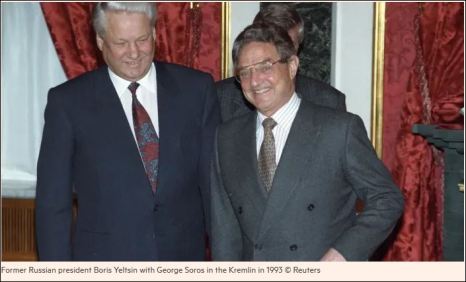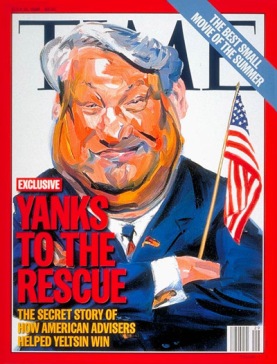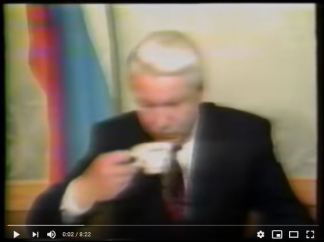“The fundamental issue for Washington is that Russia is not a vassal for American imperialism. That’s why there will be no reset. There will only be reset when American imperialism is replaced by a law-abiding, genuinely democratic US government. Until then, expect more US hostility, confrontation and even war towards Russia.” 3/28/19

Above, 1993, American currency speculator George Soros with Russian President Yeltsin at the Kremlin, Reuters. In 1990s, newly independent Russia had massive natural resources to distribute and no structure in which to so with Russia’s best interests in mind. Miraculously, currency speculator George Soros arrived on the scene to “help” fragile Russia.

Above, in newly independent “Vassal state” Russia, President Yeltsin accepts “help” of American currency speculator George Soros in meeting with Yeltsin and other officials, Tass

“Yanks to the Rescue.”…7/15/1996, Boris Yeltsin Time cover, …Article, “Rescuing Boris,” Time, Michael Kramer, Moscow, 6/24/2001, originally published 7/15/1996. US wanted puppy dog Yeltsin to remain in power but it looked like he was going to lose. So US proudly stepped in and ran his 1996 re-election campaign for him.
Isn’t it supposed to be bad to “interfere in other countries’ elections?” Can you see Mr. Putin inviting US to run his re-election campaign? US elites will not rest until they’re running Russia again like they did in the 1990s. Mr. Putin is the world's only hope to stop the US. PS. Putin was Yeltsin’s choice to replace him in 1999….If US geniuses hadn’t re-elected Yeltsin, Mr. Putin might not be where he is today.
9/21/1993, “Yeltsin reached for a cup of tea to show Russians he was not drunk," says English speaking announcer.
……………………..
3/27/19, “The Real Costs of Russiagate," The Nation, by Stephen F. Cohen..."Its perpetrators, not Putin or Trump, “attacked American democracy.””
§ The new Cold War with Russia has itself become an institution pervading American political, economic, media, and cultural life. Russiagate has made it more dangerous, more fraught with actual war, than the Cold War we survived, as I explain in War with Russia? Recall only that Russiagate allegations further demonized “Putin’s Russia,” thwarted Trump’s necessary attempts to “cooperate with Russia” as somehow “treasonous,” criminalized détente thinking and “inappropriate contacts with Russia”—in short, policies and practices that previously helped to avert nuclear war. [JFK’s respectful relationship with Khrushchev was the only reason nuclear war was averted in 1962, a war US military-intel was desperate for, tried to trick JFK into.] Meanwhile, the Russiagate spectacle has caused many ordinary Russians who once admired America to now be “derisive and scornful” toward our political life….
The very few of us who publicly challenged and deplored Russiagate allegations against candidate and then President Donald Trump from the time they first began to appear in mid-2016 should not gloat or rejoice over the US attorney general’s summary of Robert S. Mueller’s key finding: “The Special Counsel’s investigation did not find that the Trump campaign or anyone associated with it conspired or coordinated with Russia in its [alleged] efforts to influence the 2016 US presidential election.” (On the other hand, those of us repeatedly slurred as Trump and/or Putin “apologists” might feel some vindication.)
But what about the legions of high-ranking intelligence officials, politicians, editorial writers, television producers, and other opinion-makers, and their eager media outlets that perpetuated, inflated, and prolonged this unprecedented political scandal in American history—those who did not stop short of accusing the president of the United States of being a Kremlin “agent,” “asset,” “puppet,” “Manchurian candidate,” and who characterized his conduct and policies as “treasonous”?…
Nearly three years of Russiagate’s toxic allegations have entered the American political-media elite bloodstream, and they almost certainly will reappear again and again in one form or another.
This is an exceedingly grave danger, because the real costs of Russiagate are not the estimated $25–40 million spent on the Mueller investigation but the corrosive damage it has already done to the institutions of American democracy—damage done not by an alleged “Trump-Putin axis” but by Russsigate’s perpetrators themselves. Having examined this collateral damage in my recently published book War with Russia? From Putin and Ukraine to Trump and Russiagate, I will only note them here.
§ Clamorous allegations that the Kremlin “attacked our elections” and thereby put Trump in the White House, despite the lack of any evidence, cast doubt on the legitimacy of American elections everywhere—national, state, and local. If true, or even suspected, how can voters have confidence in the electoral foundations of American democracy? Persistent demands to “secure our elections from hostile powers”— a politically and financially profitable mania, it seems—can only further abet and perpetuate declining confidence in the entire electoral process. Still more, if some crude Russian social-media outputs could so dupe voters, what does this tell us about what US elites, which originated these allegations, really think of those voters, of the American people?…
No mainstream media did anything to expose, for example, two crucial and fraudulent Russiagate documents—the so-called Steele Dossier and the January 2017 Intelligence Community Assessment—but instead relied heavily on them for their own narratives. Little more need be said here about this institutional self-degradation. Glenn Greenwald and a few others followed and exposed it throughout, and now Matt Taibbi has given us a meticulously documented account of that systematic malpractice, concluding that Mueller’s failure to confirm the media’s Russiagate allegations “is a death-blow for the reputation of the American news media.”…
On August 8, 2016, the trend-setting New York Times published on its front page an astonishing editorial manifesto by its media critic. Asking whether “normal standards” should apply to candidate Trump, he explained that they should not: “You have to throw out the textbook American journalism has been using for the better part of the past half-century.” Let others decide whether this Times proclamation unleashed the highly selective, unbalanced, questionably factual “journalism” that has so degraded Russiagate `media or instead the publication sought to justify what was already underway. In either case, this remarkable—and ramifying—Times rejection of its own professed standards should not be forgotten. Almost equally remarkable and lamentable, we learn that even now, after Mueller’s finding is known, top executives of the Times and other leading Russiagate media outlets, including The Washington Post and CNN, “have no regrets.””…
......


No comments:
Post a Comment